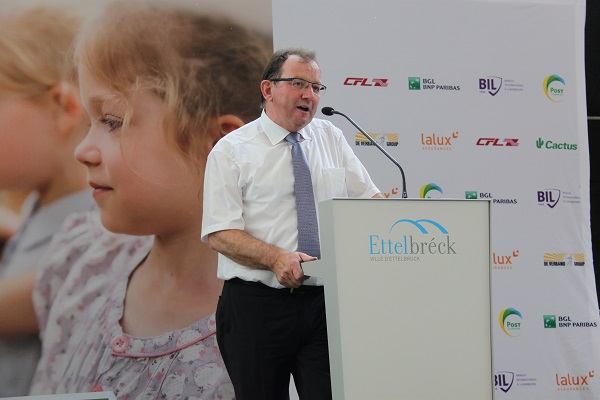
On Sunday 5 July 2015, Luxembourg's Minister for Agriculture, Viticulture and Consumer Protection, Fernand Etgen, presented the Bio-Agri-Präis 2015 in the presence of numerous guests at the Agriculture Show in Ettelbruck.
The Bio-Agri-Präis was first awarded in 2009 and comprises €4,000 prize awarded for achievements in organic farming in uxembourg. This prize is awarded to individuals, organisations and businesses (production, processing, trade, research, NGOs, etc.) that are active in organic farming in Luxembourg, either directly or indirectly.
Since last year, the prize is divided into 2 categories;, with each category involving a cash prize of €2,000, as follows: (a) Farms that are farmed organically; and (b) Processors, traders and organizsations in the field of organic farming.
The award was established as part of the national action plan for the promotion of organic agriculture in Luxembourg. The aim of the action plan is the active support in the development of organic farming in Luxembourg. Various publications, experimental fields and the network of demonstration farms have seen more activity this year.
The 7th annual Bio-Agri-Präis went this year to (a) farms that are farmed organically, to François Patrick from Hostert near Rédange. The Bio-Agri-Präis for processors, traders and organisations in the field of organic farming went to Cactus SA from Windhof.
François Patrick operates approximately 70 hectares, 50 hectares of grassland and 20 hectares of arable land. Limousin cattle are fed in winter with hay or silage from the farm. He practices different crop rotations, trying new varieties of cereals and trèfle blanc, the latter which can significantly improve the quality of hay and silage. Under current weather conditions, it is difficult to ensure good quality hay. Because of this, he has built a plant for aeration and drying hay in round bales. When the hay has dried well in the field, it is pressed. Then round bales are stored on wooden pallets in a warehouse. When the bales are heated, they are treated to 30-40 minutes on the ventilation system. Then they are delivered on pallets can be stored after a few weeks. In addition, a grain drying plant was commissioned. A Wood-based heating system heats the water, which in turn heats the air. This is blown into the trailer containing cereals. Drying is complete after 24 hours. This method is effective to optimise the storage of cereals.
Cactus SA started selling their first organic products in 1974. Since then the demand for such "bio" food has grown continuously and Cactus has reacted accordingly. Since 1994, the beginning of cooperation between Cactus and Biogros, consumers can find organic products in all Cactus supermarkets. Bio/organic shelves have even been set up in some smaller shops too. Chickens and organic fruits and vegetables are, if available in the market, from Luxembourg. Cactus has also invested in the creation of a clean organic brand that includes jams, milk, honey, baguettes
and eggs.
Minister Etgen congratulated the winners on their tireless commitment to organic farming.
Today, Luxembourg has 119 producers with a total of about 4,200 hectares of agricultural land, of which 95 are committed to enhance biological raw materials according to strict criteria. Three companies specialising in the import of organic products from countries outside the EU complement the organic agriculture sector in Grand Duchy of Luxembourg.
Photo by MAVPC: Minister Fernand Etgen








